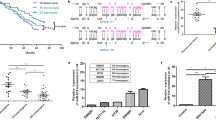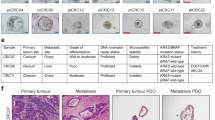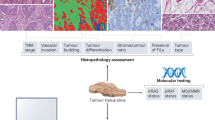Abstract
High levels of thymidylate synthase (TS) expression have been associated with poor survival of colorectal cancer (CRC) patients to 5-fluorouracil (5-FU)-based chemotherapy. Recent evidence suggests that a polymorphism within the enhancer region of the TS gene promoter can influence TS expression, with the triple repeat homozygote (3R/3R) being associated with significantly higher tumour TS levels than either the double repeat homozygote (2R/2R) or heterozygotes (2R/3R). In the present study we investigated whether TS genotype was associated with the degree of survival benefit from chemotherapy in 221 Dukes’ C stage CRC patients. Patients with the 3R/3R polymorphism (n = 58, 26%) showed no significant long-term survival benefit from chemotherapy (RR = 0.62, 95% CI: 0.30–1.25, P = 0.18), whereas those with the 2R/2R or 2R/3R genotype (n = 163, 74%) showed significant gains in survival from this treatment (RR = 0.52, 95% CI: 0.52–0.82, P = 0.005). These results demonstrate that a polymorphism within the TS gene, probably through its effect on TS expression levels, can influence the survival benefit obtained by CRC patients from 5-FU-based chemotherapy. © 2001 Cancer Research Campaign http://www.bjcancer.com
Similar content being viewed by others
Article PDF
Change history
16 November 2011
This paper was modified 12 months after initial publication to switch to Creative Commons licence terms, as noted at publication
References
Ahnen DJ, Feigl P, Quan G, Fenoglio-Preiser C, Lovato LC and Bunn PA et al (1998) Ki-ras mutation and p53 overexpression predict the clinical behavior of colorectal cancer: a Southwest Oncology Group study. Cancer Res 58: 1149–1158
Anonymous (1999) Efficacy of adjuvant fluorouracil and folinic acid in B2 colon cancer: International Multicentre Pooled Analysis of B2 Colon Cancer Trials (IMPACT B2) Investigators. J Clin Oncol 17: 1349–1355
Beck A, Etienne MC, Cheradame S, Fischel JL, Formento P and Renee N et al (1994) A role for dihydropyrimidine dehydrogenase and thymidylate synthase in tumor sensitivity to 5-fluorouracil. Eur J Cancer 30: 1517–1522
Elsaleh H, Joseph D, Grieu F, Zeps N, Spry N and Iacopetta B (2000) Evidence for tumour site and gender specific survival benefit from adjuvant chemotherapy in colorectal cancer. Lancet 355: 1745–1750
Horie N, Hideo A, Oguro K, Hojo H and Takeishi K (1995) Functional analysis and DNA polymorphism of the tandemly repeated sequences in the 5′-terminal regulatory region of the human gene for thymidylate synthase. Cell Structure Function 20: 191–197
Johnston PG, Drake JC, Trepel J and Allegra CJ (1992) Immunological quantitation of thymidylate synthase using the monoclonal antibody TS 106 in 5-fluorouracil-sensitive and resistant human cancer cell lines. Cancer Res 52: 4306–4312
Johnston PG, Fisher ER, Rockette HE, Fisher B, Womark N and Drake JC et al (1994) The role of thymidylate synthase expression in prognosis and outcome of adjuvant chemotherapy in patients with rectal cancer. J Clin Oncol 12: 2640–2647
Kawakami K, Omura K, Kanehira E and Watanabe Y (1999) Polymorphic tandem repeats in the thymidylate synthase gene is associated with its protein expression in human gastrointestinal cancers. Anticancer Res 19: 3249–3252
Leichman CG, Lenz HJ, Leichman L, Danenberg K, Baranda J and Groshen S et al (1997) Quantitation of intratumoral thymidylate synthase expression predicts for disseminated colorectal cancer response and resistance to protracted-infusion fluorouracil and weekly leucovorin. J Clin Oncol 15: 3223–3229
Lenz HJ, Leichman CG, Daneberg KD, Danenberg PC, Groshen S and Cohen H et al (1996) Thymidylate synthase mRNA level in adenocarcinoma of the stomach: a predictor for primary tumor response and overall survival. J Clin Oncol 14: 176–182
Mamounas E, Wieand S, Wolmark N, Bear HD, Atkins JN and Song K et al (1999) Comparative efficacy of adjuvant chemotherapy in patients with Dukes’ B versus Dukes’ C colon cancer: results from four National Surgical Adjuvant Breast and Bowel Project adjuvant studies (C-01, C-02, C-03, and C-04). J Clin Oncol 17: 1349–1355
Marsh S, Collie-Duguid ESR, Li T, Liu X and McLeod HL (1999) Ethnic variation in the thymidylate synthase enhancer region polymorphism among Caucasian and Asian populations. Genomics 58: 310–312
Moertel CG (1994) Chemotherapy for colorectal cancer. N Engl J Med 330: 1136–1142
Peters GJ, Van der Wilt CL, Van Groeningen CJ, Smid K, Meijer S and Pinedo HM (1994) Thymidylate synthase inhibition after administration of fluorouracil with or without leucovorin in colon cancer patients: implications for treatment with fluorouracil. J Clin Oncol 12: 2035–2042
Salonga D, Danenberg KD, Johnson M, Metzger R, Groshen S and Tsao-Wei DD et al (2000) Colorectal tumors responding to 5-fluorouracil have low gene expression levels of dihydropyrimidine dehydrogenase, thymidylate synthase, and thymidine phosphorylase. Clin Cancer Res 6: 1322–1327
Santi DV, McHenry CS and Sommer H (1974) Mechanism of interaction of thymidylate synthetase with 5-fluorodeoxuridylate. Biochemistry 13: 471–481
Soong R and Iacopetta B (1997) A rapid and non-isotopic method for the screening and sequencing of p53 gene mutations in formalin-fixed, paraffin-embedded tumors. Modern Pathology 10: 252–258
Toyota M, Ahuja N, Ohe-Toyota M, Herman J, Baylin S and Issa J-P (1999) CpG island methylator phenotype in colorectal cancer. Proc Natl Acad Sci USA 96: 8681–8686
van Triest B, Pinedo HM, van Hensbergen Y, Smid K, Telleman F and Schoenmakers PS et al (1999) Thymidylate synthase level as the main predictive parameter for sensitivity to 5-fluorouracil, but not for folate-based thymidylate synthase inhibitors, in 13 nonselected colon cancer cell lines. Clin Cancer Res 5: 643–654
Author information
Authors and Affiliations
Rights and permissions
From twelve months after its original publication, this work is licensed under the Creative Commons Attribution-NonCommercial-Share Alike 3.0 Unported License. To view a copy of this license, visit http://creativecommons.org/licenses/by-nc-sa/3.0/
About this article
Cite this article
Iacopetta, B., Grieu, F., Joseph, D. et al. A polymorphism in the enhancer region of the thymidylate synthase promoter influences the survival of colorectal cancer patients treated with 5-fluorouracil. Br J Cancer 85, 827–830 (2001). https://doi.org/10.1054/bjoc.2001.2007
Received:
Revised:
Accepted:
Published:
Issue date:
DOI: https://doi.org/10.1054/bjoc.2001.2007
Keywords
This article is cited by
-
One-carbon metabolism and global DNA methylation in mothers of individuals with Down syndrome
Human Cell (2021)
-
Prediction of exposure-driven myelotoxicity of continuous infusion 5-fluorouracil by a semi-physiological pharmacokinetic–pharmacodynamic model in gastrointestinal cancer patients
Cancer Chemotherapy and Pharmacology (2020)
-
The prognostic value of interaction between mean corpuscular volume and red cell distribution width in mortality in chronic kidney disease
Scientific Reports (2018)
-
The effects of genomic polymorphisms in one-carbon metabolism pathways on survival of gastric cancer patients received fluorouracil-based adjuvant therapy
Scientific Reports (2016)
-
The Effectiveness of Pemetrexed Monotherapy Depending on Polymorphisms in TS and MTHFR Genes as Well as Clinical Factors in Advanced NSCLC Patients
Pathology & Oncology Research (2016)



